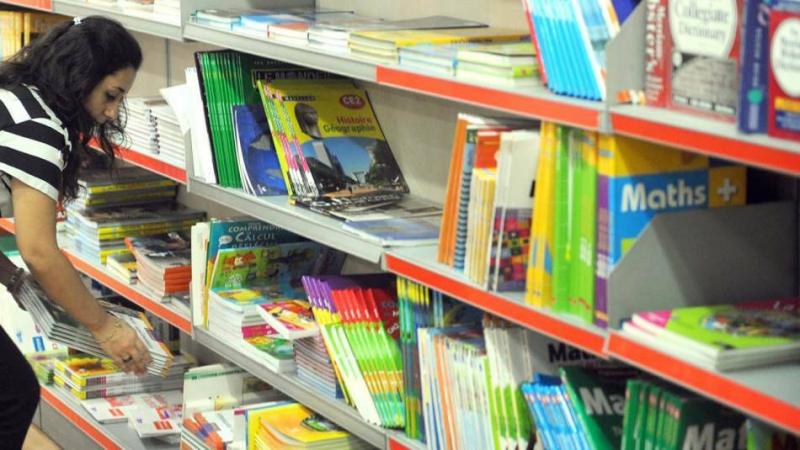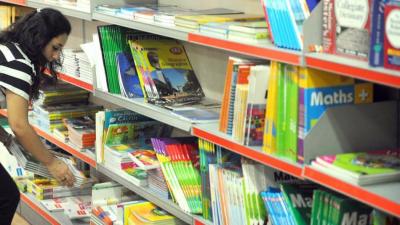Pale and angry faces simultaneously describe the state of students' parents this year as the school year approaches. Many parents were surprised by the new pricing of school books, especially those imported from abroad or foreign editions, as they, like other imported goods, are sold in "fresh dollars." This means that over 70% of parents are struggling to secure school books this year.
Ruba Hammad, a housewife, wonders how individuals whose salaries do not exceed three million or even five million Lebanese pounds can afford to buy new books, especially foreign ones, which do not have a specific pricing mechanism. The average price of a book for primary school is no less than 10 to 20 euros, or approximately 20 dollars, which amounts to about 617,000 Lebanese pounds. Some books reach prices of 60 euros, which is about one million 900 thousand Lebanese pounds, for middle and high school levels. Prices for math books start at 10 euros for primary school, and as students advance in their grades, the price of the book can rise to 90 euros, or nearly two million 900 thousand Lebanese pounds. This situation also applies to science books, such as chemistry and physics. On average, a list of primary school books for the first grade starts from three million and may reach around four million Lebanese pounds. This is a very high cost, even for people who receive part of their salaries in dollars.
**Mafia of Books**
Books have also become subject to a mafia. This phrase summarizes the general situation in large bookstores or publishing houses that import books from abroad. At one bookstore in Beirut, Ali Al-Khatib went to buy books for his second-grade child, and he stated, "The list of books is only available at one bookstore. The pricing is in fresh dollars. Those who do not have dollars cannot pay the amount in Lebanese pounds. Moreover, the price is not fixed." The employee informed him that prices could change at any moment and can only be confirmed upon payment. A book can be bought in the morning at one price, and by the afternoon, the price could be entirely different. The price fluctuation margin is significant, and it can change from hour to hour.
**Business of Bookstores and Schools**
The situation in private schools is not any better. Some have started to engage in the book trade by limiting it to a specific bookstore and obliging parents to purchase from there, or by selling books directly to parents. However, in both cases, the price remains the same, either in foreign currency or its equivalent in Lebanese pounds according to the daily exchange rate. Private schools impose their prices in foreign currency, claiming to act merely as intermediaries between parents and publishing houses or bookstores. They aim to facilitate the sale process within the school instead of requiring visits to the bookstore or publishing house. Despite this, there is a price difference between books sold at school and those sold in bookstores, as confirmed by Ruba Hammad, a mother of two daughters. She said, "I was surprised by the price difference between the school and the bookstores, even if the difference seems small and does not exceed one or two dollars. But when I asked the school administration, the response was that the cost of transporting books from the warehouses to the educational institution is high due to the rise in fuel prices."
**Reasons for Price Increases**
Aside from the debate over price differences between publishing houses and schools, the essential question concerns the reason for the price hikes this year. Ibrahim Asi, one of the publishing house officials in Lebanon, told "Al-Modon": "This year, prices have risen from the foreign source. The cause is the geopolitical situation and the rise in raw material costs for printing books: the price of paper has increased by more than 200%, and shipping costs have also risen." He noted that the Russian-Ukrainian war has its implications: insurance costs for shipping books imported from Europe have increased.
On the other hand, Asi denied that there is any form of monopoly in the book trade, affirming that publishing houses have adhered to the official exchange rate or the platform price in the past two years. Some educational institutions and bookstores have retained excess stock of books from 2019, thus not raising their prices but rather helping to share the burdens with the parents of students.
**Questions for the Authorities**
If imported book prices are influenced by geopolitical conditions, what about Lebanese books, and how are they priced? There are two types of books in the Lebanese market. The first is specific to the governmental curriculum, used by students in public schools, and the second is known as Lebanese books designated for private education, meaning schools that do not rely on foreign books. As of now, neither type has been priced by the concerned authorities, whether in the Ministry of Education or the Ministry of Economy, nor have used books been priced.
Bookstore owners refuse to sell used or official books, claiming they are waiting for the Ministry of Education to set a price so they can know the mechanism for selling them. Will books be priced according to the black market exchange rate, or according to a new price that may be agreed upon? Or at the rate of 12,000 Lebanese pounds per dollar?
**Social Solidarity**
This situation regarding the book trade has fostered a sense of solidarity among parents, especially through social media. Dozens of pages are established daily to enable parents to communicate to buy or swap used books among themselves in order to ease the burden of the crisis. Ruba Hammad confirms this, mentioning initiatives from some expatriates to support associations that provide used books for free to parents, in exchange for their return at the end of the school year. While this initiative is noteworthy in a country experiencing a prolonged economic crisis, it does not negate that school books have their traders and monopolists.




